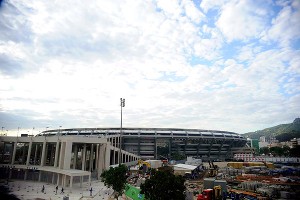Rio judge nixes Brazil-England friendly
The state government of Rio de Janeiro said in a statement Thursday it would appeal the decision by Judge Adriana Costa dos Santos. The government said the stadium meets all the safety standards required.

Football's world governing body FIFA and the local World Cup organizing committee tried to distance themselves from the problems, saying they were not responsible for organizing the Brazil vs. England match.
Local organizers, however, acknowledged they are using the match to view "operational areas."
In her ruling, Costa dos Santos said she was cancelling all matches in the stadium until local organizers presented the documents showing that the venue is appropriate to host events. She said the decision was made to guarantee the "safety of fans at the Maracana."
Prosecutors said that the stadium must remain closed until it is shown there will no safety or health risks to the public attending events at the venue. Prosecutors said they received a police report, saying the stadium presented "safety risks" and added that "dangerous materials" were at the site.'
They also noted there were not adequate measures for crowd control at the 79,000-seat venue.
The government said the problems were due to a "bureaucratic error," and said a report showing that the stadium is safe was not delivered to the proper authorities.
The eight-team Confederations Cup, and next year's 32-team World Cup, has been plagued by delays in getting stadiums ready. The preparations have received open criticism from FIFA, the governing body of world football.
The six stadiums being used for the Confederations Cup -- a warmup for the World Cup -- are in various stages of readiness. Six others that will be used for next year's World Cup are still being built, and FIFA has demanded they be ready by Dec. 31.
Earlier, Press Association Sport reported the Brazilian football federation (CBF) had been made aware of the issue and it was urgently looking at its implications.
The CBF at the time was unwilling to say whether the match at Rio de Janeiro's world famous stadium, which has been given a major facelift ahead of Brazil hosting next year's World Cup, would proceed as planned.
FIFA Secretary General Jerome Valcke was in Brazil earlier this month to check on venues. He's acknowledged the Confederations Cup will be a maze of unfinished work and admitted that "not all operational arrangements will be 100 percent." He then warned "this will be impossible to repeat for the FIFA World Cup."
"The World Cup, we can't reduce any requirement," he added. "On any (other) competition that would be fine, except at the World Cup. The World Cup is 99 percent of the FIFA system. The World Cup has to be perfect. The World Cup is the diamond of FIFA."
The Maracana stadium in Rio is scheduled to host the Confederation Cup final on June 30, and will be the venue for the World Cup final next year. It is also slated to host the opening and closing ceremonies of the 2016 Olympics.
Brazil President Dilma Rousseff this week offered praised for the six Confederation Cup venues, including Maracana.
"Many people did not think we would be able to build these stadiums before the Confederations Cup at the standards required by FIFA," Rousseff said.
She made reference to what she called the "old-mutt" complex, a sense that Brazil lacked confidence and would fail to meet the challenge.
"But the workers who built these stadiums, the businessmen hired to do these works and all the governments involved have proved that Brazil is able to accept challenges and fulfill promptly commitments undertaken."
The England squad, which is hoping to qualify for the 2014 World Cup, arrived in Rio from on Thursday for the match. The squad is staying at a hotel on Rio's Copacabana Beach.

























